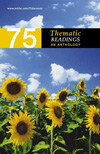
George Orwell |  |
George OrwellGeorge Orwell, "Shooting an Elephant" George Orwell (1903-1950) was born in Motihari, Bengal and graduated
from Eton College in 1921. Over the years, he worked as a dishwasher in
Paris, as a bookstore clerk in London, and as a teacher. Orwell also served
England during World War II, attaining the rank of sergeant. Orwell was
a novelist, journalist, and essayist—and outstanding in all three forms.
Central questions of politics—especially concerning authoritarianism—are
never far from the surface of his incisive writing. His best-known long
works are the novels Animal Farm (1945) and Nineteen Eighty-Four
(1949), both of which have been adapted for film, and the memoir Down
and Out in Paris and London (1933). He was also both an editor and
columnist for the Tribune and a foreign correspondent for the Observer,
two English newspapers. Orwell died of tuberculosis in London at the age
of forty-seven. "Shooting an Elephant" was first published in
the journal New Writing in 1936 and was collected in Shooting
an Elephant and Other Essays (1950). | QUESTIONS FOR DISCUSSION | CONTENT - What's Orwell's job during the time he recounts here?
- What is betel juice?
- Describe the feelings the elephant evokes in the narrator when
he first sees it. What's the elephant doing then?
- Why does Orwell ask to borrow an elephant rifle initially? Describe
how things change from his original plan.
- How does the author characterize the crowd that gathers?
- How many shots does it take to kill the elephant?
- Characterize the relationship the author describes between the
Indian people and the Europeans.
STRATEGY AND STYLE - Study paragraph six and find two comparisons Orwell makes regarding
the elephant. Are these comparisons conflicting? Explain. How might
you relate these things to his feelings about the animal at the time?
- Discuss this piece as a process analysis. What process does Orwell
explain, and how does he analyze it? Is this merely an explanation of
how to shoot an elephant or something else?
- Discuss the importance of description in this essay. Where in the
text does Orwell appeal directly to the senses? Defend your answer with
specifics from your reading.
- Why does Orwell put the world natives in quotation marks
in paragraph nine? What might this usage say about his politics?
- Examine the last paragraph. What four points of view does the author
discuss? What group mentioned throughout is now absent? Where does he
place himself within these points of view? How effective is this conclusion?
| ENGAGING THE TEXT | - What are your feelings about killing animals? Are you perhaps a
vegetarian? How might these feelings have affected your reading of this
essay?
- Have you traveled to other countries? If you have, where have you
been? If not, do you plan to do so? Explain. How might these actions,
ideas, or both have influenced your interaction with this reading?
| SUGGESTIONS FOR SUSTAINED WRITING | - Orwell writes "that when the white man turns tyrant it is
his own freedom that he destroys." Explain what he means by this
apparent paradox. Apply this statement to one troubling current issue
in the U.S.
- Was this killing justified? Does Orwell justify his action to himself?
Trace all the reactions to the killing that he mentions, building upon
your work from "Style" question e.) above, in your answer.
| FOR FURTHER RESEARCH | What were the British doing in Burma (now Myanmar) in the 1930s? How
long had they been there? Can you find any accounts of friction between
them and the Indian people? How did your research deepen your understanding
of this piece? | WEB CONNECTION | Did you know that this author has been a fairly frequent contributor
to film? Here are some links
to reviews of the 1984 adaptation of 1984. Find one online and
read it. What did you learn about the book from the review? | LINKS | Biographical You're ready to use the Web to learn more about Orwell. These George
Orwell resources will get you started. These include links to biographies,
images, texts, and quotes, as well as a photo. Here's an excerpt
from the biography, George Orwell: A Life. What did you learn
about Orwell from it that you didn't know before? You might want to start with a standalone biography. Here's a brief
one at Encyclopedica.com, which has some hyperlinks and is followed
by an Orwell bibliography.
Bibliographical How about some quotations
by Orwell? Would you feel comfortable using these in a paper about the
author? Why or why not? How would you cite them? If you don't know,
how would you find out? Want to know how to make a perfect cup of tea? Take a look at Orwell's
approach. Be warned: it takes eleven steps, and even then, some
"controversial points" arise. For a streamlined approach to Orwell bibliographies, why don't
you visit the relevant directory
at Yahoo.com?
Cultural Interested in what other Orwellians have on their minds? A message
board is a good place to find out. This one
is called the George Orwell Forum Frigate and it's worth a look, maybe
even a post or two. Do you like to collect books? This page
revolves around collecting Orwell's works, and also includes some Orwellian
links. Speaking of collecting books.... This is the homepage
for an exhibition of Orwell's works from the Daniel J. Leab collection
at Brown University. What do you think of Orwell's handwriting? Is this
the kind of exhibit you'd be likely to visit in person?
|
|
|
|